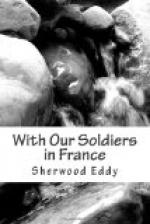One sergeant thus states his convictions: “Perhaps it would be well if we out here could get up a committee of inquiry on ‘Civilians and Religion’ and arrive at some decision as to what is the matter with you at home. Are we to return home where the spiritual fires have been kept burning brightly, or to the blackened ashes of those great ideals of the early days of August, 1914, which have burned themselves out? Are we to return to a country in which, in spite of all the community of suffering and sorrow, the Christian churches have still their differences simmering instead of being regiments in one common Army?”
Another soldier writes: “What could not the churches do for the world if they could only connect the symbols Christ gave us with the knowledge that is within the hearts of men? There must be more known about suffering and sacrifice now in the hearts of men than at any past time. I thought once, on the Somme, that the two races facing each other in such agony were as the two thieves on their crosses reviling each other, and that somewhere between us, if we could but see Him, was Christ on His Cross.”
4. The men are bewildered and repelled by the Church’s divisions. There is a widespread feeling among them that there is something wrong here, that instead of representing Christ or losing themselves in the wide interests of His Kingdom, instead of concern for the winning of the world and humanity as a whole, the aims of many of the churches are petty, narrow, exclusive, and sectarian. There is a feeling among the men that far too many Christians are working for themselves or for their own particular branch of the Church, or are, as one of them puts it, “out for their own show.”
In the last hospital we visited, the young American Episcopal chaplain working with one of our own units asked the writer to accompany him one morning to help him in cheering up the patients, giving them Testaments, meeting their needs, and answering their doubts and difficulties. While we were proceeding through one of the wards, the Nonconformist chaplain came by. The writer was speaking to a poor boy who was dying. The chaplain seemed shocked and surprised that we were speaking to one of his patients without his permission. The young Episcopal chaplain explained that he felt sure that the chaplain would not mind if we tried to help the men. Although he followed him out of the ward and tried his best to make his peace with him, the chaplain reported the matter, and we were prevented from doing personal Christian work in neighboring hospitals.




